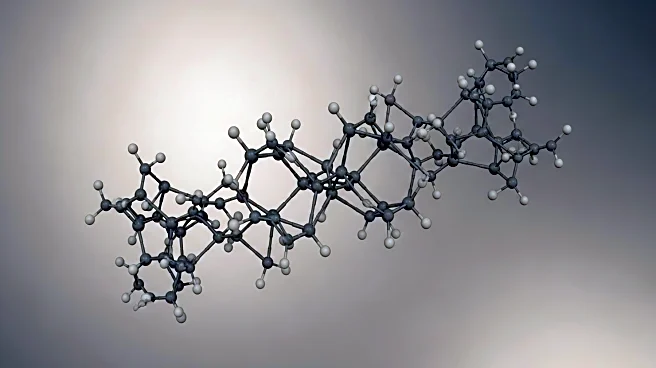What is the story about?
What's Happening?
Recent research has discovered that a dual-backbone pectic polysaccharide, referred to as SHP-A, significantly enhances the immune activity of macrophages. The study highlights the activation of the NOD1/RIPK2/NF-κB signaling pathway and mitochondrial metabolism as key mechanisms. SHP-A was purified and characterized, revealing its complex structure composed of two distinct backbones: a pectin backbone and a glucomannan backbone. The polysaccharide demonstrated no cytotoxic effects on mouse macrophages and significantly increased cellular proliferation and nitric oxide release, which are crucial for antimicrobial activity. Additionally, SHP-A was found to potentiate phagocytotic activity and inflammatory mediator secretion, indicating its potential as an immunomodulatory agent.
Why It's Important?
The findings are significant as they offer insights into the potential use of SHP-A in enhancing immune responses, particularly in macrophages, which play a critical role in host defense against pathogens. By activating the NOD1/RIPK2/NF-κB pathway, SHP-A could be utilized to boost immune function, potentially leading to new therapeutic strategies for infectious diseases. The study also underscores the importance of mitochondrial metabolism in immune regulation, suggesting that targeting these pathways could improve immune responses. This research could pave the way for developing novel immunotherapies that leverage polysaccharides to modulate immune activity.
What's Next?
Further research is needed to explore the full therapeutic potential of SHP-A in clinical settings. Investigations into its effects on human macrophages and its efficacy in treating specific infections could be the next steps. Additionally, understanding the long-term impacts of SHP-A on immune system modulation and its interactions with other immune pathways will be crucial. Researchers may also focus on optimizing the extraction and purification processes to enhance the yield and efficacy of SHP-A for potential pharmaceutical applications.
Beyond the Headlines
The study highlights the broader implications of polysaccharide-based immunomodulation, which could lead to advancements in vaccine development and immune therapies. The ethical considerations of manipulating immune responses through such compounds must be addressed, ensuring safety and efficacy in human applications. Furthermore, the research contributes to the growing field of bioactive polysaccharides, emphasizing their role in health and disease management.















